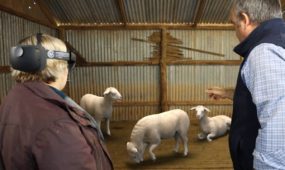Global search for gig city partners begins Down Under
Technology
A GLOBAL search for tech enterprises and investors to build and manage Australia’s first Ten Gigabit city has begun.

Sign up to receive notifications about new stories in this category.
Thank you for subscribing to story notifications.
Adelaide, the capital of South Australia, has today called for Expressions of Interest (EOI) to build and manage fibre optic infrastructure to house the Gigabit speeds.
Last year the Adelaide City Council announced its Ten Gigabit City ambition to help transform the state’s economy from a traditional manufacturing base to more knowledge-based, hi-tech industries.
fibrecentres
Adelaide Lord Mayor Martin Haese said the EOI was an important milestone in the provision of Gigabit internet speeds that would boost the city 1.3 million’s economic and investment growth.
“The City of Adelaide is dedicated to having the fastest, most reliable, secure and flexible data transfer in the nation … if not the world,” he said.
“We can see from the overseas experience in cities like Boston, Chattanooga, Dayton (Oregon) and Salisbury (North Carolina), that this infrastructure will attract new businesses, in new growth industries, and support the growth of existing businesses in a city seeking transformational growth in 21st century jobs and increases in export income.
“Ten Gigabit City can put Adelaide firmly on the map as a destination of choice for digital-rich big data businesses within the health, education, creative, finance and defence sectors, to name just a few.”
Organisations wanting to register their interest in the Ten Gigabity City Project can log onto the Tenders SA website.
The EOI closes on February 7.
Adelaide is already well placed to upgrade its internet infrastructure after becoming the first city outside of the United States to join Smart City initiator and internet application development organisation US Ignite.
It was also named Australia’s first Lighthouse City by Cisco.
The rollout will use an existing SABRENet optical fibre network to connect specific technology parks, such as Tonsley, and the state’s Health and Biomedical Precinct.
The network will also be connected in co-working spaces in the CBD of Adelaide, such as the St. Paul’s Creative Centre and Hub Adelaide.
Late last year, Peter Karidis, managing director of international Smart City consultancy Palamir, said Adelaide possessed unique advantages that made it the ideal city to adopt new advances in technology.
“Adelaide is the perfect size city; it has a well-defined CBD with a good population size for testing new applications,” he said.
Karidis said Adelaide’s small size meant a quicker rollout of fibre optic infrastructure and smart technology than other cities in Australia.
Jump to next article



